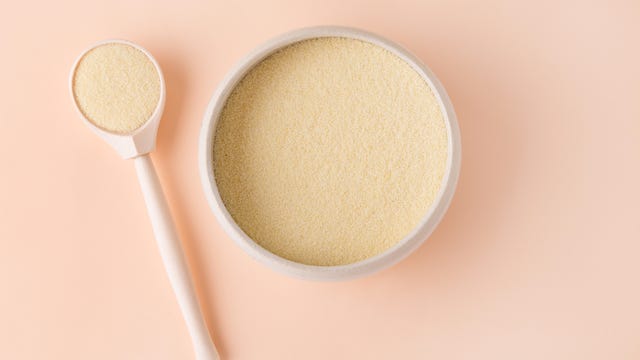Best Vitamins and Supplements for Joint Health of 2024








Pain or stiffness is a common experience, but it’s always best to see a doctor who knows your medical history to make sure you’re addressing the cause of your pain and doing what you can to manage or minimize it through dietary changes or other lifestyle or exercise modifications. For some people, adding a supplement can be an easy way to make sure you’re doing everything you can to help relieve your pain, but keep in mind that research is often mixed on whether even the best supplements or vitamins for joint pain will help ease your symptoms.
“Overall, I think it’s hard to find a complete solution to your joint pain by using supplements alone,” said Doctor Navya Mysorea family physician and women’s health expert. But aside from assessing a person’s medical history and any medications they’re taking that could interact with their supplement of choice, there’s no harm in adding a joint health supplement, Mysore said.
Best Joint Supplements of 2024
While “there’s not a lot of evidence to say for sure that one supplement is going to help you more than another,” Mysore said, glucosamine probably has the most evidence to support its use. Glucosamine occurs naturally in our bodies — it’s in your cartilage and helps your joints function. A glucosamine supplement is believed to help with arthritis by relieve some of the pain caused by osteoarthritis or rheumatoid arthritis. According to the Arthritis Foundation, Glucosamine is often sold in combination with chondroitin as a single dietary supplement, and both are two of the most commonly used dietary supplements for arthritis.
Mysore said that people with shellfish and iodine allergies should be careful about taking this supplement, as it is often made from shellfish and can also affect people with asthma. It can cause side effects such as nausea and heartburn, and there is also a risk of interaction with blood thinners or anticoagulants that can cause bleeding problems. Talk to your doctor or a dietitian before adding it to your diet.
Omega-3s are fatty acids that can help reduce inflammation and joint pain. Some studies have shown that these supplements can Reduce stiffness in people with arthritis and also combat joint pain; Other research has shown that they may “prevent experimental arthritis and may reduce disease activity in rheumatoid arthritis.” If you are currently taking a blood thinner, talk to your doctor before taking an omega-3, because they can interact and pose health risks.
It is also important to note that it may be more beneficial to get your omega-3s through your diet, if possible. One omega-3 rich diet to get you started is the Mediterranean diet.
Turmeric is not only a spice used in some cuisines, it is also used in traditional medicine as a healing spice, and it is considered one of the most powerful natural ingredients you can add to your diet for a health boost. In particular, the active ingredient or compound, curcumin, has antioxidant and anti-inflammatory properties.
Mysore says that if you’re interested in adding a turmeric supplement for pain relief, make sure it contains curcumin for better absorption. And as an alternative, tastier way to incorporate the spice’s wellness properties into your routine, Mysore suggested a meal that includes turmeric and black pepper, which contains a connection that can help the body absorb the important properties of turmeric. For example, she said, a smoothie with added turmeric and eggs flavored with black pepper.
As with any supplement on this list, you should consult your doctor if you are taking prescription medications, as turmeric may interfere with blood thinners and immunosuppressive medications, according to Johns Hopkins Medicine.
Vitamin D is known to support bone health, which is why some believe that a vitamin D supplement may be helpful in helping joint health. There is some research that suggests taking a vitamin D supplement may help with arthritis pain and inflammation, but the results do not necessarily provide a definitive answer.
Overall, vitamin D is a great resource for the body, helping with other functions such as cognitive function, immune function, and mood. However, be careful when adding a vitamin D supplement to your routine, as high levels of this vitamin can interact with several medications. High levels of vitamin D in particular can be very problematic if you Lanoxinbecause it can carry a risk of hypercalcemia. (Unless your doctor recommends it, most health experts seem to recommend it no more than take 4,000 IU per day.) Otherwise medicines mixed with a vitamin D supplement may also affect the way your body processes the supplement.
People often turn to vitamin E to support their immune system because it is an antioxidant. And there is some research that shows vitamin E may slow the progression of osteoarthritis And promote the growth of new cartilage cells. However, much of this research still needs more research. That said, vitamin E is a good supplement to keep in your rotation, as it also promotes good vision and brain health. Just be aware that it can interact with blood thinners and put you at risk for bleeding.
Chondroitin is often mentioned alongside glucosamine because they are similarly studied for arthritis and are often sold together as a single supplement. Chondroitin is also found in the cartilage in your body, so it is believed to be beneficial for joint health. Research on chondroitin has had largely inconclusive results, but it is still accepted as a supplement that can be beneficial for joint health. It is generally considered a safe supplement, although like many others, it can interact with blood thinners such as Warfarin and put you at risk for bleeding.
Collagen is a protein that your body makes — and as you get older, you have less and less of it. It’s what keeps your skin tight and firm and your joints moving smoothly. But as you get older, there’s less collagen in your joints, and that’s where joint supplements can help. While there’s not a lot of research on it or collagen can actually help your jointsdoctors generally agree that it is harmless. If it makes you feel better in combination with low impact exercise like swimming, then go ahead and do it.
How We Chose the Best Joint Health Supplements
We haven’t tested any supplements for joint health ourselves. Instead, we’ve compiled a list of the top compounds, supplements, and vitamins with some research that supports arthritis symptom relief and joint health.
Factors to Consider When Choosing a Joint Health Supplement
Cause of joint pain: Before you start taking any joint supplement, it is important to determine the cause of your symptoms to find the real cause and prevent further health effects. There are over 100 different types of arthritis, according to the Arthritis FoundationThe easiest way to find the cause of your symptoms is to see your doctor. He or she can also tell you what supplements you can take, based on your current medications and medical history.
Whether you are taking medication: Many common prescription medications, including blood thinners, can interact with certain supplements taken for joint health and cause serious side effects. Always be sure to discuss any new supplement with your doctor or pharmacist before adding it to your daily rotation if you are taking medications, even though you can easily get most supplements without a prescription.
Food allergy: Some joint health supplements may contain common food allergens, such as fish, so always check the product label for ingredients and ask the company you are purchasing from.
Frequently Asked Questions About Joint Supplements
What is arthritis?
Arthritis is the most common cause of joint pain, according to the Cleveland Clinic; arthritis is a collective term for joint pain and joint disease. According to the Arthritis Foundation, osteoarthritis is the most common form of arthritis and causes pain in the hands, spine, hips, and knees. Arthrosis According to the Mayo Clinic, this occurs when the cartilage that protects the bones wears down over time.
Do joint supplements really work?
Evidence Supports Even the Best Joint Supplements doesn’t seem to be conclusivealthough some studies have shown that supplements can improve arthritis symptoms. Supplements are not intended to be used as a cure for a medical condition, but rather as something that supplement or supplement your diet, especially if you are deficient in a nutrient. The supplements in this best list were chosen because research has found a potential benefit for joint health, but whether you decide to take one depends on the medications you have been prescribed and your individual health concerns.
Does the FDA Approve Dietary Supplements?
No, the US Food and Drug Administration “does not approve or research supplements as it does medications or drugs.”[The] “FDA does not generally approve dietary supplement claims or other labeling prior to use,” the statement said. However, there are manufacturing practices and marketing regulations that companies that make supplements must follow.
For more information, read how to read a supplement label here.











